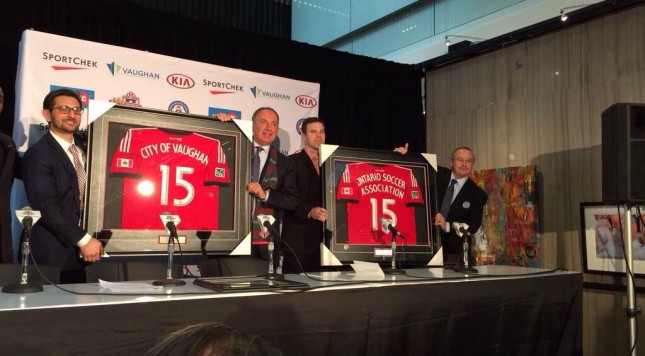The final pieces of the puzzle were unveiled today, as Toronto FC II and an unnamed New York Red Bulls team were announced for the 2015 USL Pro season. TFC2 has been in the works since November, while NYRB2 (for lack of a better name) has been the league’s worst keep secret over the past few months. So where does that leave the league coming into the season in terms of the league’s health?
TFC2 and NYRB2 bring the total of MLS-operated USL Pro teams to eight. They are joined by Los Angeles Galaxy II, Seattle Sounders II, Portland Timbers II, Vancouver Whitecaps II, Real Monarchs and FC Montreal. Not only is this a boon for MLS in terms of player development, but it provides stability that had at times been lacking over the past few seasons for USL Pro.
Since 2011, ten teams have disappeared from the ranks of the league. While Orlando City parlayed a successful three year spell in the third division into a move up to MLS, more have wound up like the three Puerto Rican teams. Poorly attended and lacking the funds to operate, Puerto RIco United, River Plate Puerto RIco and Sevilla Puerto Rico all shut their doors following the 2011 season. Having fully supported USL Pro teams that are operated by their parent clubs in MLS ensures that the clubs will not have to close due to lack of funds or attendance, and it also creates an avenue for crossover fans of the parent club to see rising players as they begin their careers.
Additionally, 12 USL Pro teams have affiliation agreements with MLS clubs. While for most United States pro soccer fans, this simply means that young top-flight players will not have to waste away on the bench, it also serves an important factor for the affiliates. Due to the nature of the affiliation loans and the ability to recall a player at will, the wages generally don’t enter the books of the host club, but stay with the parent club. For a third-tier side that doesn’t necessarily have the funds to sign for depth, this is a blessing in terms of filling out their roster with quality players.
Only four of the 24 teams are going into the 2015 season unattached: Colorado Springs Switchbacks, Orange County Blues, Pittsburgh Riverhounds and the Tulsa Roughnecks. Colorado Springs could very well work out a deal akin to what Oklahoma City and Orlando City worked out with Sporting Kansas City last season and split an affiliation agreement with Charlotte Independence. The Roughnecks partially share an ownership group with their red dirt rival OKC Energy, and that ownership group has recently announced the shuttering of their Triple-A hockey team in OKC so capital should be freed up.
On top of the stability that MLS has offered USL Pro, players are beginning to take their chances going down to the third division. Just last week the Austin Aztex signed promising US youth international, and an alum of the FC Dallas Academy, Mikey Ambrose after he decided to forgo his senior year of eligibility at Maryland to play professionally in front of Eberly’s Army. He was joined by goalkeeper Devin Perales in making the decision, normally a choice reserved for players who are looking to move abroad or jump to MLS.
Finally, the league’s footprint has never been wider. The 2011 edition of USL Pro featured just one team west of the Mississippi, Orange County. That footprint steadily grew over the course of the last four years, with two teams in 2013, five in 2014 and now a full thirteen teams west of the Mississippi ahead of the 2015 season. This has led the league office to develop a new competitive format for the 2015 season. Going into this season, the league will feature an Eastern and Western Conference, the first time there has been a conference structure in the league since 2011 when they had the old American and National Divisions.
The landmark agreement signed in 2013 between MLS and USL Pro has clearly paid dividends not even five years out. With a new competition format for 2015, a record number of teams and dedicated ownership groups, USL Pro looks to be well on its way to an exciting 28th season.
(image courtesy of Toronto FC)




















